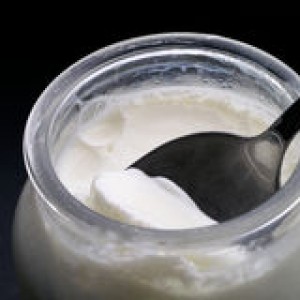News
EFSA: no link between fat-free yogurt and weight loss
9 Jan 2015Following an application from Spain, EFSA was asked to deliver an opinion on the scientific substantiation of a health claim related to fat-free yogurts and fermented milks complying with the specifications “fat free”, “low in sugars”, “high protein”, “source of calcium” and “source of vitamin D” for nutrition claims and reduction of body and visceral […]

 Following an application from Spain, EFSA was asked to deliver an opinion on the scientific substantiation of a health claim related to fat-free yogurts and fermented milks complying with the specifications “fat free”, “low in sugars”, “high protein”, “source of calcium” and “source of vitamin D” for nutrition claims and reduction of body and visceral fat mass while maintaining lean body mass in the context of an energy-restricted diet.
Following an application from Spain, EFSA was asked to deliver an opinion on the scientific substantiation of a health claim related to fat-free yogurts and fermented milks complying with the specifications “fat free”, “low in sugars”, “high protein”, “source of calcium” and “source of vitamin D” for nutrition claims and reduction of body and visceral fat mass while maintaining lean body mass in the context of an energy-restricted diet.
The scope of the application was proposed to fall under a health claim based on newly developed scientific evidence.
The food that is the subject of the health claim is fat-free yogurts and fermented milks complying with the specifications “fat free”, “low in sugars”, “high protein”, “source of calcium” and “source of vitamin D” for nutrition claims. The Panel considers that fat-free yogurts and fermented milks complying with the specifications “fat free”, “low in sugars”, “high protein”, “source of calcium” and “source of vitamin D” for nutrition claims are sufficiently characterised.
Upon EFSA’s request for clarification, the applicant indicated that the claimed effect refers to the loss of body and visceral fat mass while maintaining lean body mass in the context of an energy-restricted diet. The target population proposed by the applicant is “overweight or obese adults that are following energy-restricted diets”. The Panel considers that reduction of body and visceral fat mass while maintaining lean body mass in the context of an energy-restricted diet is a beneficial physiological effect.
The applicant identified 168 human publications, including 48 intervention studies, 20 observational studies, 12 meta-analyses, 13 reviews, and 75 other studies (bioavailability and mechanistic studies), claimed as pertinent to the claim. Additionally, 23 animal studies and three in vitro studies were submitted. All human intervention studies were performed with foods which did not comply with the specification of the food which is the subject of the claim.
The Panel notes that no human studies from which conclusions could be drawn for the scientific substantiation of the claim were provided by the applicant.
On the basis of the data presented, the Panel concludes that a cause and effect relationship has not been established between the consumption of fat-free yogurts and fermented milks complying with the specifications “fat free”, “low in sugars”, “high protein”, “source of calcium” and “source of vitamin D” for nutrition claims and reduction of body and visceral fat while maintaining lean body mass in the context of an energy-restricted diet.
Related news

Retail landscape lacks nutritious and affordable food, says ATNi
30 Dec 2025
A rapid increase in modern food retail has given retailers growing influence over consumer diets, according to global non-profit ATNi’s latest assessment.
Read more
Debate over ban on ‘meaty’ names for plant-based products reaches stalemate
26 Dec 2025
The debate over a ban on plant-based products using “meaty” terms has reached a stalemate, leaving manufacturers in limbo and still facing overhauls to their marketing and packaging.
Read more
Innovation promise in 'maturing' plant-based dairy alternatives market
8 Dec 2025
Plant-based dairy is a maturing market that still faces significant hurdles around taste, functionality, nutrition, and price, but industry is innovating fast, according to experts speaking at Fi Europe.
Read more
Celebrating the winners of the Fi Europe Innovation Awards 2025
3 Dec 2025
Food industry stakeholders celebrated as the winners of the Fi Europe Innovation Awards were announced at a ceremony in Paris.
Read more
Big appetite for M&A between European and US food and drink companies
3 Dec 2025
Persistent tariffs on EU food and beverage exports have helped drive record levels of M&A activity between European and US companies this year, according to analysis by ING.
Read more
Non-UPF Program extends certification scheme to entire food industry
30 Nov 2025
The Non-UPF Program has extended its certification scheme to the wider food sector, championing a move towards healthier consumption habits.
Read more
Empowering innovation in fortification and colouration
13 Nov 2025
Divi’s Nutraceuticals offers a large portfolio of innovative, high-quality ingredients for foods, beverages, and supplements, with bespoke solutions and expert support for product success.
Read more
Danone highlights digestive health as potential ‘tipping point’ for food industry
13 Nov 2025
Danone is betting on a food industry “tipping point” that will bloat the market for healthy products, particularly those related to gut health.
Read more
Standing Ovation and Bel scale up casein production from dairy co-products
11 Nov 2025
Foodtech company Standing Ovation has partnered with cheese specialist Bel Group to manufacture dairy serums for industrial-scale casein production via precision fermentation.
Read more
New UPF standard hoped to offer consumers ‘coherence and clarity’
10 Nov 2025
Ingredients companies are being urged to enter “a new era of partnership and innovation” following the launch of the industry’s first non-UPF verification scheme.
Read more